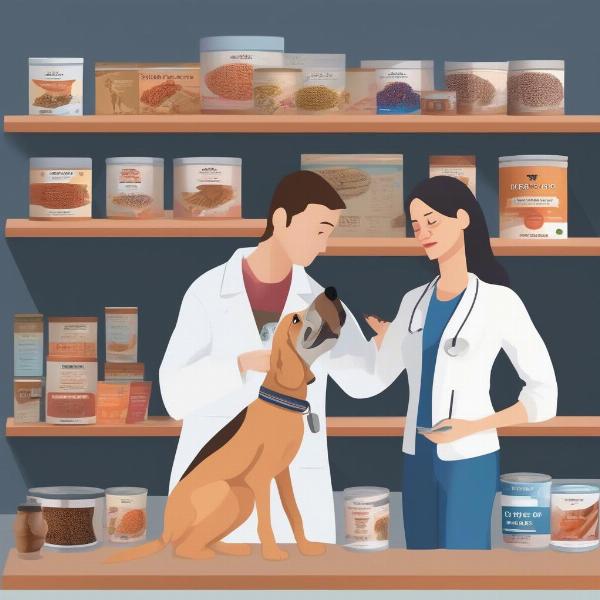Hepatic food for dogs plays a vital role in managing liver disease. It’s specially formulated to support liver function and overall health in dogs with compromised livers. This guide will delve into the importance of hepatic diets, how to choose the right one, and what to expect when transitioning your dog to this specialized food. Understanding the needs of a dog with liver issues is crucial for providing the best possible care.
Understanding the Need for Hepatic Dog Food
Dogs with liver disease require a specific diet to manage their condition. A healthy liver plays a crucial role in filtering toxins, metabolizing nutrients, and producing bile for digestion. When the liver is compromised, these functions can be affected, leading to a range of health problems. Hepatic food is designed to reduce the workload on the liver while providing essential nutrients.
Key Benefits of a Hepatic Diet
- Reduced copper: Copper accumulation can be toxic to a damaged liver. Hepatic diets are low in copper to prevent further damage.
- Increased zinc: Zinc helps bind copper and promote its excretion.
- Moderate protein: While protein is essential, excessive amounts can strain the liver. Hepatic diets provide the right balance of high-quality, easily digestible protein.
- Restricted sodium: Sodium can contribute to fluid retention, which can be problematic for dogs with liver disease. Hepatic diets are typically low in sodium.
- Digestible carbohydrates: These provide readily available energy without overtaxing the liver.
- Enhanced palatability: Many hepatic foods are formulated to be highly palatable, which can be important for dogs with decreased appetite due to liver disease.
Choosing the Right Hepatic Food for Your Dog
Selecting the appropriate hepatic food for your dog is a crucial step in managing their liver condition. Consult with your veterinarian to determine the best option based on your dog’s specific needs and the severity of their liver disease.  Selecting the appropriate hepatic food for your dog They can assess your dog’s overall health and recommend a suitable diet.
Selecting the appropriate hepatic food for your dog They can assess your dog’s overall health and recommend a suitable diet.
Factors to Consider
- Veterinary recommendations: Your vet is the best source of information for your dog’s specific needs.
- Ingredients: Look for high-quality, easily digestible ingredients.
- Nutrient profile: Ensure the food meets the specific nutritional requirements of dogs with liver disease.
- hepatic dog food Palatability: If your dog refuses to eat the food, it won’t provide any benefits.
- Cost: Hepatic diets can be more expensive than regular dog food.
Transitioning Your Dog to Hepatic Food
Switching your dog to a hepatic diet should be done gradually to avoid digestive upset. Start by mixing a small amount of the new food with their current food and gradually increase the proportion of hepatic food over a period of 7-10 days. This allows your dog’s digestive system to adjust to the new diet.
Monitoring Your Dog’s Progress
Once your dog is fully transitioned to hepatic food, monitor their appetite, weight, and overall health. Regular check-ups with your veterinarian are essential to track their liver function and make any necessary adjustments to their diet. dog hepatic Keeping a close eye on your dog’s response to the new diet will ensure its effectiveness.
Conclusion
Hepatic food is a crucial component of managing liver disease in dogs. By understanding the importance of this specialized diet, choosing the right food for your dog, and transitioning them carefully, you can help support their liver health and improve their quality of life. Remember to consult with your veterinarian for personalized guidance and ongoing monitoring. royal canin hepatic dog food Providing the right nutrition is essential for dogs with compromised livers.
FAQ
- What are the signs of liver disease in dogs? Signs can include jaundice (yellowing of the skin and eyes), vomiting, diarrhea, lethargy, weight loss, and increased thirst.
- Can hepatic food cure liver disease? Hepatic food cannot cure liver disease, but it can help manage the condition and improve the dog’s quality of life.
- How long will my dog need to eat hepatic food? This depends on the severity and type of liver disease. Your veterinarian will determine the appropriate duration.
- Are there any homemade hepatic dog food recipes? It’s best to consult with a veterinary nutritionist before attempting a homemade diet, as it’s crucial to ensure the correct balance of nutrients.
- What if my dog doesn’t like hepatic food? There are several brands and flavors available. Your veterinarian can help you find a palatable option.
- Can hepatic food be given to healthy dogs? No, hepatic food is specifically formulated for dogs with liver disease and should not be given to healthy dogs.
- Is hepatic food expensive? Hepatic food is generally more expensive than regular dog food due to its specialized formulation.
Dr. Emily Carter, DVM, a board-certified veterinary internist, emphasizes the importance of dietary management in liver disease: “Proper nutrition is vital for supporting liver function and minimizing the progression of the disease. Hepatic food provides the specific nutrients needed to manage the condition effectively.” Dr. David Lee, a veterinary nutritionist, adds: “A well-balanced hepatic diet can significantly improve a dog’s comfort and overall well-being.”
ILM Dog is a leading international pet website dedicated to providing expert advice and resources on all aspects of dog care. We offer valuable information on dog breeds, health, training, nutrition, grooming, and much more. From choosing the right breed to understanding specific dietary needs like hepatic dog requirements, we provide expert insights to help you provide the best possible care for your furry companion. For further assistance, please contact us via email at [email protected] or by phone at +44 20-3965-8624. ILM Dog is your trusted partner in responsible dog ownership.